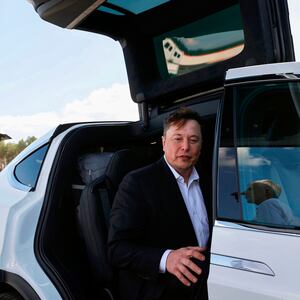A San Francisco jury awarded a massive $136.9 million verdict to a former Tesla worker on Monday over claims that he was subjected to racist treatment by his supervisors. “It’s been an emotional rollercoaster,” said the plaintiff, Owen Diaz, in an interview with The Daily Beast on Monday evening. “The jury knew that this is not just for me; this verdict is for everybody that works at Tesla. This is their way of putting Elon Musk on notice.”
Diaz, who is Black, claimed that the electric carmaker cast a blind eye to harassment. His supervisors allegedly taunted him with racist imagery and used epithets against him.
“[I] had supervisors telling me, ‘N----r, hurry up and push the button’; ‘N----r, push these batteries out of the elevator.’ And they were also telling me, ‘N-----s aren’t shit,’” he said.
The verdict included $6.9 million in compensatory damages and $130 million in punitive damages, according to the legal publication Law360. It wasn’t immediately clear what percentage of those funds would go to Diaz’ attorneys, or whether Tesla would be able to reduce the payout on appeal.
Representatives for Tesla did not immediately respond to requests for comment; an attorney for the company declined to comment about the verdict when asked by The Wall Street Journal.
Many Tesla employees are bound by mandatory arbitration contracts, which typically prevent them from suing over workplace grievances—and are far less likely to generate enormous verdicts. Diaz, by contrast, was apparently eligible to sue, since he joined the company as a contractor. He spent less than a year at Tesla before leaving in the spring of 2016.
“God's justice is that I didn't sign the arbitration agreement,” he said. “Arbitration is not good for the common worker… These companies are using arbitration to effectively turn workers into slaves.”
Diaz expressed frustration that Musk, who serves as CEO of both Tesla and the rocket company SpaceX, has not reached out to him to apologize for the alleged mistreatment. “Elon has not called me, sent me a letter, a text, sky writing, or sent up one of them spaceships to say I’m sorry,” he said.
Diaz’ case was previously highlighted in a 2018 exposé in The New York Times, which documented a pattern of alleged harassment and discrimination at Tesla. The company denied wrongdoing, saying that it strives “to provide a respectful work environment for all employees and do our best to prevent bad conduct.”
Monday’s verdict comes on the heels of a separate decision against Tesla involving racial misconduct. In August, the firm was reportedly forced to pay roughly $1 million to an employee who said his supervisors had called him the n-word.
Other similar lawsuits have been filed in recent years; Tesla has consistently denied wrongdoing.
Diaz said he is considering using part of his payout to start a business, with plans to hire former prisoners and people experiencing homelessness. “They don’t have a support system,” he said. “They feel they’re trapped in the system.”
First, though, he was headed home for sleep. On Tuesday, he planned to go fishing or tend to his garden. The squash and zucchini, he said, have been feeling neglected.





